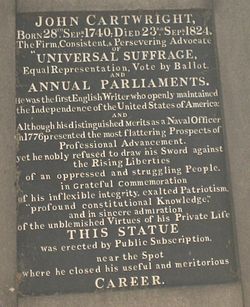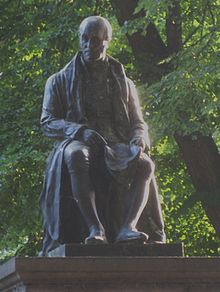- John Cartwright (political reformer)
-
For other people with this name, see John Cartwright (disambiguation).
John Cartwright 
Full name John Cartwright Born 17 September 1740
Marnham, Bassetlaw, Nottinghamshire, England, Great BritainDied September 23, 1824 (aged 84)
Burton Crescent, EnglandEra 18th-century philosophy Region Western Philosophy Main interests Politics John Cartwright (17 September 1740 – 23 September 1824) was an English naval officer, Nottinghamshire militia major and prominent campaigner for parliamentary reform. He subsequently became known as the Father of Reform. His younger brother Edmund Cartwright became famous as the inventor of the steam power loom.
Contents
Further information: Great Britain in the Seven Years WarHe was born at Marnham in Nottinghamshire, being the elder brother of Edmund Cartwright, inventor of the power loom and the younger brother of George Cartwright, trader and explorer of Labrador. He was educated at Newark-on-Trent grammar school and Heath Academy in Yorkshire, and at the age of eighteen entered the Royal Navy.
He was present, in his first year of service, at the capture of Cherbourg, and served in the following year in the Battle of Quiberon Bay between Sir Edward Hawke and Admiral Hubert de Brienne, Comte de Conflans. Engaged afterwards under Sir Hugh Palliser and Admiral John Byron on the Newfoundland station, he was appointed to act as chief magistrate of the settlement; and the duties of this post he discharged for five years (1765–1770).
From 1763 to 14 May 1766, Cartwright was commander of HM Cutter Sherborne.[1] His brother George, when at loose ends, went with him on a cruise out of Plymouth to chase smugglers in Sherborne.
Ill-health necessitated his retirement from active service for a time in 1771. When the disputes with the American colonies began, he saw the colonists as having right on their side, warmly supported their cause and at the outbreak of the ensuing American War of Independence even refused an appointment as first lieutenant to the Duke of Cumberland, which would have put him on the path of certain promotion, since he did not wish to fight against the cause which he felt to be just. In 1774 he published his first plea on behalf of the colonists, entitled American Independence the Glory and Interest of Great Britain.
Nottinghamshire Militia and Reform
In 1775, when the Nottinghamshire Militia was first raised, he was appointed major, and in this capacity he served for seventeen years. He was at last illegally superseded, because of his political opinions.
In 1776 appeared his first work on reform in parliament, which, with the exception of Earl Stanhope's pamphlets (1774), appears to have been the earliest publication on the subject. It was entitled, Take your Choice, a second edition appearing under the new title of The Legislative Rights of the Commonalty Vindicated, and advocated annual parliaments, the secret ballot and manhood suffrage.
The task of his life was thenceforth chiefly the attainment of universal suffrage and annual parliaments. In 1778 he conceived the project of a political association, which took shape in 1780 as the Society for Constitutional Information, including among its members some of the most distinguished men of the day. From this society sprang the more famous London Corresponding Society. Major Cartwright worked unweariedly for the promotion of reform. He was one of the witnesses on the trial of his friends, John Horne Tooke, John Thelwall and Thomas Hardy, in 1794.
He left his large estate in Lincolnshire in 1803[2] or 1805 [3] to move to Enfield, Middlesex, where he made friends with other leading Radicals including Sir Francis Burdett, 5th Baronet, William Cobbett and Francis Place.
In 1812, he initiated the Hampden Clubs, named after John Hampden, an English Civil War Parliamentary leader, aiming to bring together middle class moderates and lower class radicals in the reform cause. To promote the idea, he toured northwest England later in 1812, in 1813 (getting arrested in Huddersfield) and in 1815. He recruited John Knight who founded the first Hampden Club in Lancashire and later asked Major Cartwright to speak at what became the Peterloo Massacre, but the elderly Cartwright was unable to attend. In 1819, he was arrested for speaking at a parliamentary reform meeting in Birmingham, indicted for conspiracy and was condemned to pay a fine of £100.
Cartwright then wrote The English Constitution, which outlined his ideas including government by the people and legal equality which he considered could only be achieved by universal suffrage, the secret ballot and equal electoral districts. He became the main patron of the Radical publisher Thomas Jonathan Wooler, best known for his satirical journal The Black Dwarf, who actively supported Cartwright's campaigning.
Cartwright had sent a copy of The English Constitution to former President of the United States, Thomas Jefferson. Jefferson wrote to Cartwright in July:
"Your age of eighty-four, and mine of eighty-one years, ensure us a speedy meeting. We may then commune at leisure, and more fully, on the good and evil, which in the course of our long lives, we have both witnessed; and in the mean time, I pray you to accept assurances of my high veneration and esteem for your person and character".[4]
He died in London, on 23 September 1824, and was buried at St Mary's Church Finchley. He had married in 1780, but had no children. In 1831, a monument from a design by Macdowell was erected to him in Burton Crescent, WC1H, London, where he had lived. Burton Crescent was later renamed Cartwright Gardens in his honour.
The Life and Correspondence of Major Cartwright, edited by his niece F. D. Cartwright, was published in 1826. This and other correspondence is currently being transcribed onto the internet by Brussels-based political analyst Gary Cartwright at [1]
Industry
In 1788, Major Cartwight sold his heavily mortgaged estates at Marnham, buying others at Brothertoft, Lincolnshire. The same year with 18 others, he erected a large mill at East Retford, called the Revolution Mill in celebration of the centenary of the Glorious Revolution. He hoped to weave cloth using the weaving patents of his brother Edmund Cartwright. He also began the mechanical spinning of wool, or rather worsted. This business did not prove to be a success. The mill stood idle within a few years and was advertised to sale in 1798 and 1805.[5]
Legacy
Captain George Vancouver named Cartwright Sound, on the west coast of Graham Island in the Queen Charlotte Islands of British Columbia, Canada, in his honour in relation to his Royal Navy service under Admiral Howe.[6]
External links
References
 This article incorporates text from a publication now in the public domain: Chisholm, Hugh, ed (1911). Encyclopædia Britannica (11th ed.). Cambridge University Press.
This article incorporates text from a publication now in the public domain: Chisholm, Hugh, ed (1911). Encyclopædia Britannica (11th ed.). Cambridge University Press.
- ^ Tobias Smollet. January 1793. The Critical Review, or Annnals of Literature. (London: W. Simpkin and R. Marshal), pp. 32-33.
- ^ "John Cartwright, Esquire". The New Monthly Magazine (Henry Colburn) XII (1 November): 522. 1824. http://books.google.co.uk/books?id=wTQaAQAAIAAJ&pg=PA522. Retrieved 2011-04-15.
- ^ Cartwright, Major John (1826). Cartwright, F D. ed. The Life and Correspondence of Major Cartwright. 1. London: H Colburn. p. 322. http://babel.hathitrust.org/cgi/pt?id=wu.89053439170.
- ^ John W. Osborne, John Cartwright (Cambridge University Press, 1972), p. 152.
- ^ W. H. Challoner, People and Industries (1963), 48-9. S. D. Chapman, 'The Pioneers of worsted spinning by power' Business History 7(2) (1965), 103-5.
- ^ "Cartwright Sound". BC Geographical Names. http://apps.gov.bc.ca/pub/bcgnws/names/29226.html.
Categories:- 1740 births
- 1824 deaths
- British activists
- British businesspeople
- British philosophers
- British suffragists
- People from Nottinghamshire
Wikimedia Foundation. 2010.


